-
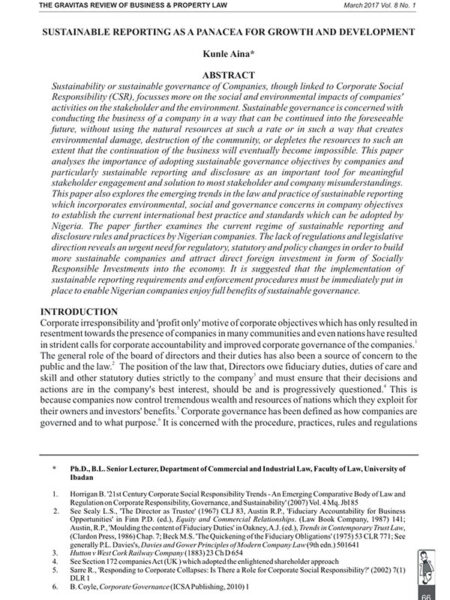
Sustainable Reporting as a Panacea for Growth and Development
0₦2,500.00Dr Kunle Aina of the Department of Commercial and Industrial Law, University of Ibadan in his article “Sustainable Reporting as a Panacea for Growth and Development” examines the concept of Sustainable Reporting, which is reporting the social and environmental impact of corporate activities on stakeholders and the environment. He analyses the importance of adopting sustainable governance objectives by companies and particularly sustainable reporting and disclosure as an important tool for meaningful stakeholder engagement and solution to most stakeholder and company misunderstandings. He reviews international best practices on Sustainable Reporting and bemoans the legislative and regulatory framework for sustainable governance and reports in Nigeria which are so scanty as to be classified as non-existent.
-
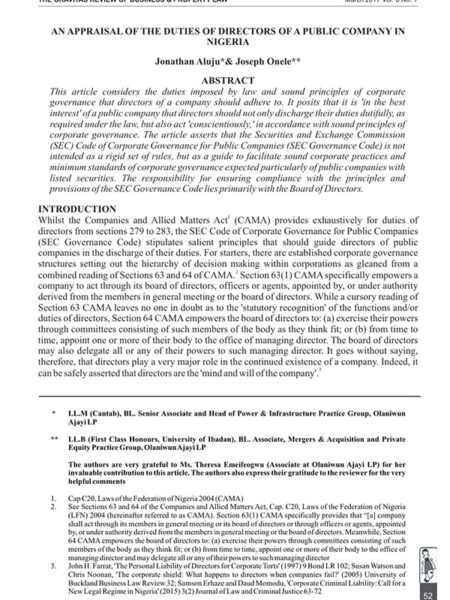
An Appraisal of the Duties of Directors of a Public Company in Nigeria
0₦2,500.00Jonathan Aluju and Joseph Onele, Associates at Olaniwun Ajayi LP in their article “An Appraisal of the Duties of Directors of a Public Company in Nigeria” consider the duties imposed by law and principles of corporate governance that directors of a company should adhere to. They examine the duty of directors, what is ‘in the best interest’ of a public company, corporate benefit and opportunities, and multiple and interlocking directorships within the context of case law, CAMA and SEC Code of Corporate Governance for Public Companies.
-
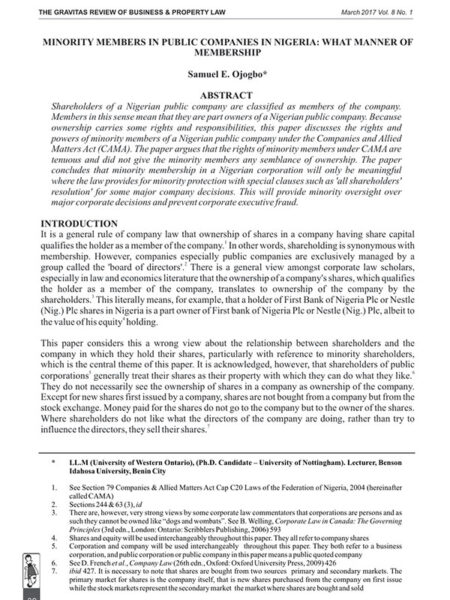
Minority Members in Public Companies in Nigeria: What Manner of Membership
0₦2,500.00Samuel Ojogbo of the Faculty of Law, Benson Idahosa University, Benin City in “Minority Members in Public Companies in Nigeria: What Manner of Membership” discusses the rights and powers of minority members of a Nigerian public company and argues that the rights of minority members are tenuous. He contends that the powers in a Nigerian listed company are in reality shared between the majority members and the board of directors. He posits that only the majority members with their insider knowledge and control of the corporation’s wealth and activities may properly be called the owners while the minority members, the so-called ‘corporate outsiders’, just make up the numbers. He concludes that the rights granted under section 300 of CAMA amount to little, as insider knowledge which a minority member lacks, is required to trigger the rights.
-
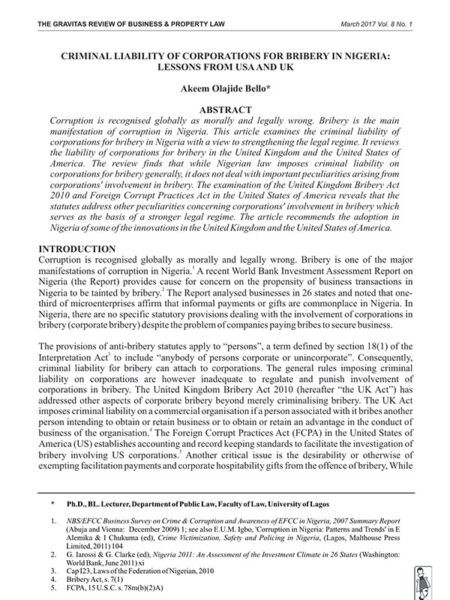
Criminal Liability of Corporations for Bribery in Nigeria: Lessons from USA and UK
0₦2,500.00Dr Akeem Bello of the Department of Public Law, University of Lagos in his article “Criminal Liability of Corporations for Bribery in Nigeria: Lessons from USA and UK” examines Nigerian law on bribery and posits that there is no specific legislation designed to criminalise corporate bribery. He examines the criminality of ‘Facilitation Payment’ and ‘Corporate Hospitality’ and recommends that expanding the scope of bribery offences to cover all “persons”irrespective of whether they are public, private sector officials or corporate entities will strengthen the law on bribery in Nigeria.
-
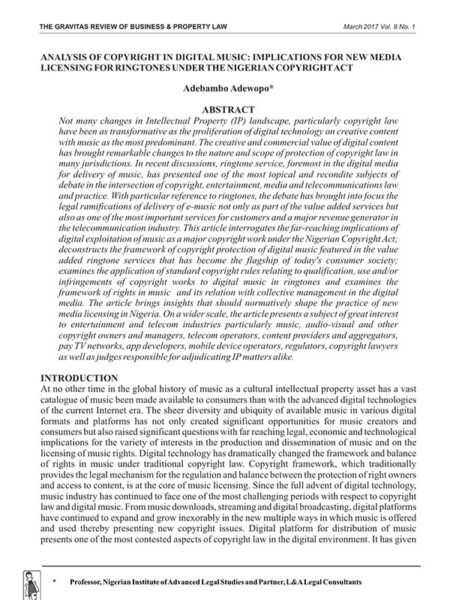
Analysis of Copyright in Digital Music: Implications for New Media Licensing for Ringtones under the Nigerian Copyright Act
0₦2,500.00Professor Adebambo Adewopo of the Nigerian Institute of Advanced Legal Studies and Partner, L & A Legal Consultants, in his article “Analysis of Copyright in Digital Music: Implications for New Media Licensing for Ringtones Under the Nigerian Copyright Act” provides a seminal exposition of the intersection of copyright law and entertainment, media and telecommunication industries in Nigeria, addressing the most contested and recondite issue in those industries at the moment. The article interrogates the far-reaching implication of digital exploitation of ring tunes under the Nigerian Copyright Act; deconstructs the framework of copyright protection of digital music; considers the copyright rules for qualification, use and infringement of work, and application to digital music in ringtones; examines issues relating to the key rights and collective management in the digital media under the extant Copyright Act and discusses insights that should shape the practice of new media licensing that is ultimately of great interest to practitioners in the creative economy.
-
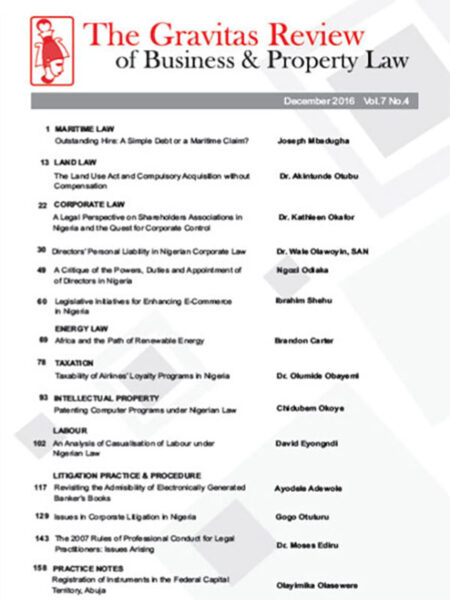
The Gravitas Review of Business & Property Law Vol.7 No.4 – Print
0₦5,000.00In this issue of The Gravitas Review of Business & Property Law Vol.7 No.4, there are well researched articles on:
- Maritime
- Land Law
- Corporate Law & Practice
- Energy
- Taxation
- Intellectual Property
- Labour
- Litigation Practice & Procedure
- Practice Notes
-

The Gravitas Review of Business & Property Law Vol.7 No.4 – E-Book
0₦5,000.00In this issue of The Gravitas Review of Business & Property Law Vol.7 No.4, there are well researched articles on:
- Maritime
- Land Law
- Corporate Law & Practice
- Energy
- Taxation
- Intellectual Property
- Labour
- Litigation Practice & Procedure
- Practice Notes
-

The Gravitas Review of Business & Property Law Vol.7 No.4
0₦5,000.00In this issue of The Gravitas Review of Business & Property Law Vol.7 No.4, there are well researched articles on:
- Maritime
- Land Law
- Corporate Law & Practice
- Energy
- Taxation
- Intellectual Property
- Labour
- Litigation Practice & Procedure
- Practice Notes
-
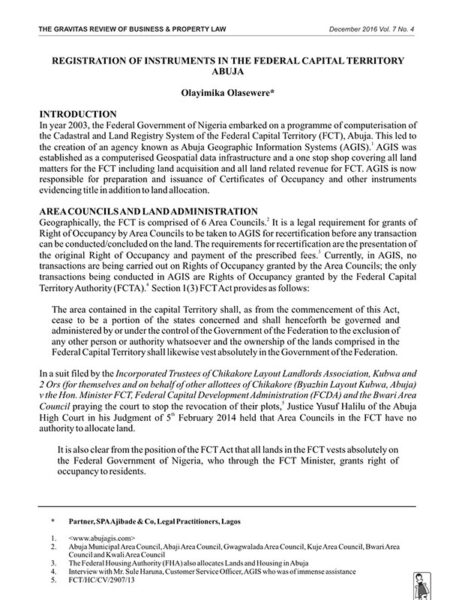
Registration of Instruments in the Federal Capital Territory, Abuja
0₦2,500.00Olayimika Olasewere, Partner, SPA Ajibade & Co., Legal Practitioners, gives a practical guide on registration of title in Abuja in his article “Registration of Instruments in The Federal Capital Territory Abuja”.
-
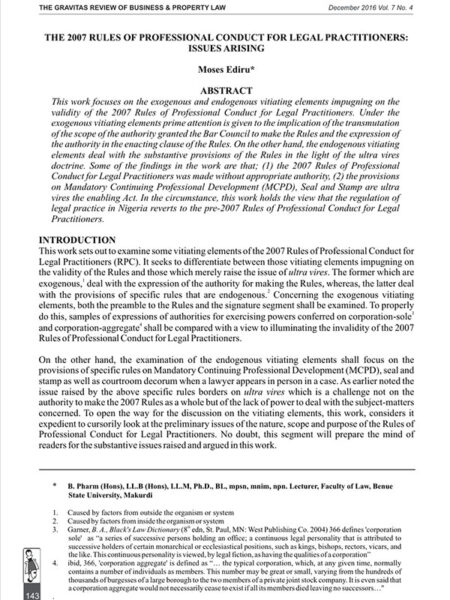
The 2007 Rules of Professional Conduct for Legal Practitioners: Issues Arising
0₦2,500.00Dr. Moses Ediru of the Faculty of Law, Benue State University, Makurdi in his compelling piece “The 2007 Rules of Professional Conduct for Legal Practitioners: Issues Arising” gives exogenous and endogenous vitiating elements impugning the validity of the 2007 Rules of Professional Conduct for Legal Practitoners (RPC). He argues that the 2007 RPC was made without appropriate authority, the provisions on Mandatory Continuing Professional Development (MCPD), Seal and Stamp are ultra vires the Legal Practitioners Act and the decision of the Supreme Court in Gen. Sarkin Yaki v Senator Abubakar Bagudu on the Seal and Stamp, was reached per incuriam.
-
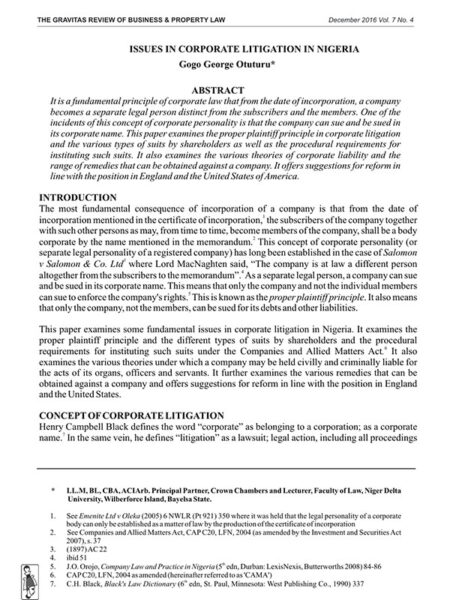
Issues in Corporate Litigation in Nigeria
0₦2,500.00Gogo Otuturu of the Faculty of Law, Niger Delta University, Wilberforce Island, Bayelsa State in his article “Issues in Corporate Litigation in Nigeria” examines a myriad of issues in corporate litigation including theories of corporate liability, the proper plaintiff principle, personal, representative and derivative actions by shareholders, pre-action notice and limitation period.
-
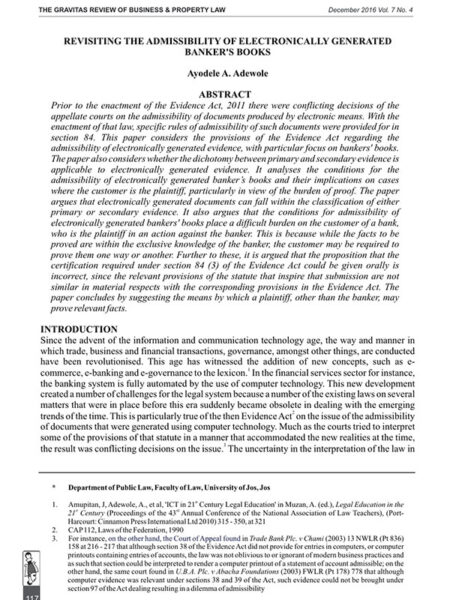
Revisiting the Admissibility of Electronically Generated Banker’s Books
0₦2,500.00Ayodele Adewole of the Department of Public Law, University of Jos in his rivetting article “Revisiting the Admissibility of Electronically Generated Bankers’ Books” analyses the provision of the Evidence Act, 2011 as it relates to the admissibility of electronically generated documents, especially bankers’ books. He considers whether the dichotomy between primary and secondary evidence is applicable to electronically generated evidence. He argues that the requirement for certification under section 84 places a difficult burden on the customer of a bank, who is the plaintiff in an action against the banker and has to prove a fact within the exclusive knowledge to the banker, who generates, stores and has custody of the record. In such a case, the interests of the party seeking to prove, and that of the party against who the document is sought to be proved is not coterminous, thereby resulting in frustration for the party seeking to prove the fact.
The Gravitas Review of Business & Property Law



